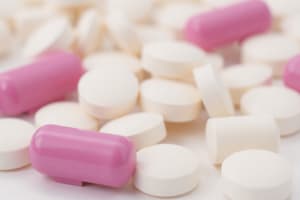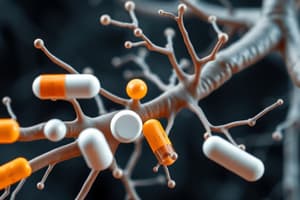Podcast
Questions and Answers
Match the adverse effects with the corresponding description:
Match the adverse effects with the corresponding description:
Postural “Orthostatic” hypotension = Due to α- blockade Anticholinergic ‘Atropine-like’ effects = Due to muscarinic R blockade (blurred vision, dry mouth, tachycardia, constipation, and urinary retention) CNS depression = Excessive sedation (histaminic H1 blockade), lassitude, fatigue, and occasionally, confusion Sympathomimetic effects = Including tachycardia, sweating, and insomnia
Match the type of MAO inhibitor with its description:
Match the type of MAO inhibitor with its description:
Non-selective MAO inhibitors = Phenelzine Selective MAO-A inhibitors = Moclebemide Selective MAO-B inhibitors = Selegiline (transdermal patch)
Match the monoamine oxidase (MAO) type with its main metabolized neurotransmitters:
Match the monoamine oxidase (MAO) type with its main metabolized neurotransmitters:
MAO-A = Predominantly metabolizes NA, 5-HT, and DA MAO-B = Preferentially metabolizes DA
Match the type of MAOI with its mechanism of action:
Match the type of MAOI with its mechanism of action:
Match the following with their correct statements:
Match the following with their correct statements:
Match the following with their correct descriptions:
Match the following with their correct descriptions:
Match the adverse effect with the type of food that should be avoided in patients on long term non-selective MAO inhibitor therapy:
Match the adverse effect with the type of food that should be avoided in patients on long term non-selective MAO inhibitor therapy:
Match the manifestation with the condition that can result from giving SSRIs along with or just after stopping MAO inhibitors:
Match the manifestation with the condition that can result from giving SSRIs along with or just after stopping MAO inhibitors:
Match the type of MAO inhibitor that may produce less inhibition of gut and hepatic MAO at low doses due to avoiding first-pass metabolism:
Match the type of MAO inhibitor that may produce less inhibition of gut and hepatic MAO at low doses due to avoiding first-pass metabolism:
Match the treatment with the adverse effect it is used for in patients experiencing the cheese reaction:
Match the treatment with the adverse effect it is used for in patients experiencing the cheese reaction:
Match the etiology with the reason for significant increase in serotonin levels in synapses when SSRIs are given along with or just after stopping MAO inhibitors:
Match the etiology with the reason for significant increase in serotonin levels in synapses when SSRIs are given along with or just after stopping MAO inhibitors:
Match the primary site of action with the location where these drugs inhibit MAO which metabolizes potentially toxic substances like tyramine:
Match the primary site of action with the location where these drugs inhibit MAO which metabolizes potentially toxic substances like tyramine:
Flashcards are hidden until you start studying




